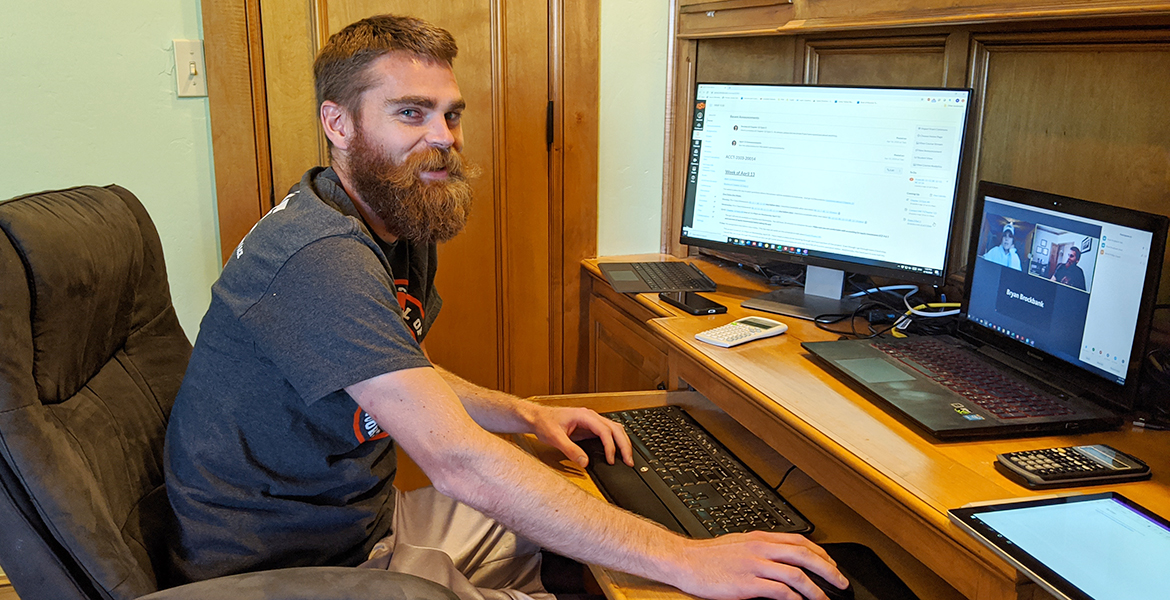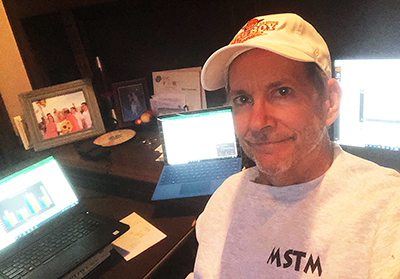
Rolling with the Changes
Monday, July 20, 2020
Business faculty pivot to adapt to online teaching in coronavirus crisis
Dr. Bryan Brockbank and his family were looking forward to a spring break trip to St. Louis to visit relatives and tour some historic church sites in the area. The family had planned the trip for months, and anticipation was building with less than 48 hours before they were to depart. But all of that changed on March 12.
On that Thursday, spring break plans changed for nearly everyone. Oklahoma State University announced that all classes would be held online the two weeks after spring break because of the coronavirus pandemic. Instead of departing for a week of relaxation and rejuvenation, many faculty members began to make other plans.
"I care about these kids. I want them to be successful and I want them to learn. The easy way out would be to say . . . we’ll just make it easier on everybody so there’s less stress during this time . . . but in the long term it's doing them a disservice."
Just six days later — Wednesday, March 18 — it was announced that classes would be taught virtually for the remainder of the spring semester. Students would not be returning to campus after spring break, and the May commencement would be postponed until December.
Brockbank, his wife, Sarah, and two kids decided to stay home, and his focus quickly turned to preparing to teach online courses for the first time. An assistant professor of accounting in his third year as a full-time instructor, Brockbank was teaching two Intermediate Accounting I courses in face-to-face classes on the Stillwater campus.

While many in Spears Business were already teaching online, this was a first for Brockbank, who spent much of his spring break figuring out how to teach nearly 150 students virtually. He began recording classroom videos to share with the students, eventually recording more than 50 videos for his classes. Brockbank’s time management skills were put to the test over the final seven weeks of the semester.
“It’s a huge time commitment, but I care about these kids. I want them to be successful and I want them to learn,” Brockbank said. “The easy way out would be to say it’s just too hard to cover these concepts, so let’s get rid of this assignment, this project and this exam, and we’ll just make it easier on everybody so there’s less stress during this time. In my mind, that’s the easy way out. That may feel good to them in the short term, but in the long term it’s doing them a disservice.
“I want them to learn the material because they need to know this material. Not all of my students are going to take the CPA exam but a good portion of them are, and the material I’m covering right now is on the CPA exam, and they need to know it. I can’t sacrifice that quality because I know that it’s important for them and for their careers.”
For his first week online, Brockbank kept his office hours unchanged at the originally scheduled four and a half hours. But when he didn’t hear from a single student, he adjusted.
“I thought this is a waste of bandwidth, a waste of time, so by the end of the week, I decided I don’t have office hours anymore. I told them to contact me whenever it’s convenient for them,” said Brockbank, who began answering emails and video calls from students as early as 8 a.m. and continuing throughout the day, sometimes as late as 10 p.m.
“I care about them. I want them to be successful. I want them to learn the material, and if that’s the case, then I can’t be limited and say I’m only available for two hours on Monday and two hours on Wednesday,” he said.
Brockbank is just one of many Spears Business faculty who have gone above and beyond to ensure students were successful in navigating the unchartered territory of virtual learning.
“All my professors have been great. They respond to all my emails right away if I have questions,” said Gracie Szakin, a hospitality and tourism management senior who finished her degree in May. “They put up different discussions and were doing Zoom calls just to talk with us. They understand that it’s really difficult, so they’re being really gracious when it comes to different things. And they’ve done a good job of making it go online without it being overwhelming or no work at all. They’ve done a really good job, and I’m really thankful for that.”
Dr. Rick Wilson taught the first business school online class at OSU in 1992, the quantitative methods course in the MBA program. The head of the Department of Management Science and Information Systems teaches three classes each semester, one face-to-face and two online, so the March announcement was not as shocking to him as it was to Brockbank.
“There are still a lot of misconceptions even today about online education, including you can’t learn as much, but I’d say you can learn more,” Wilson said. “You can replay the video showing the faculty member solving problems, and that’s what I teach, a problem-solving class. You can replay me over and over again, and that’s a good thing, compared to having to catch everything I do in class at that very moment in a face-to-face class.”
Wilson said that although the delivery method is different, the objective is the same whether students are learning in the Business Building with the instructor standing in front of them or at home looking at computer screens.
“The importance of it goes back to how I approach an online class,” he said. “The first thing you have to do is build those relationships with students so that they know you’re going to be committed to their success, which means you’re going to convince them that what they’re learning is worthwhile and useful and practical, that you’re on their team. That’s why they call me ‘Coach,’ because that’s the way I approach teaching. I’m a facilitator, I’m a coach, not up on my soapbox passing down lightning bolts of wisdom. I’m helping them develop their skills so that they can go out and be successful.”
Dr. Joe Byers drew up a continuity plan for Martin Midstream Partners several years ago when he was employed there, and he saw the need to create learning materials online after moving into the higher education world. The Department of Finance faculty member is comfortable teaching online classes but moving three face-to-face upper-level courses online in a week was more of a challenge than he expected.
The assistant professor of professional practice was teaching four finance classes in the spring (three face-to-face and one online) when the decision to go virtual was announced.
“Transitioning three classes to fully online has not gone quite as smoothly as I thought it would go. It has had some challenges,” he said at the time. “Zoom has been a godsend. Without Zoom, I don’t know how this would have worked.”
Byers, like Brockbank and Wilson, adjusted his schedule to make himself available to assist his students. “I told them that I’ll answer the phone later at night if need be, just because I know the situation we are all in,” he said.
“To be honest with you, I think the students have adapted well,” Byers said. “They have their support groups, and they have their family and friends from back home that have provided them with what they need as far as all the support they need to get through this.”
But Spears Business faculty continue to show that the Power of Personal is more than just words — it’s how they treat and interact with students.
“This has shown that we can adapt, we can sustain and we can move forward,” Byers said. “It’s been a different Power of Personal, and I don’t think that’s changed; we just adapted to teaching online.”
MEDIA CONTACT: Terry Tush | Director, Marketing and Communications | 405.744.2703 | terry.tush@okstate.edu
